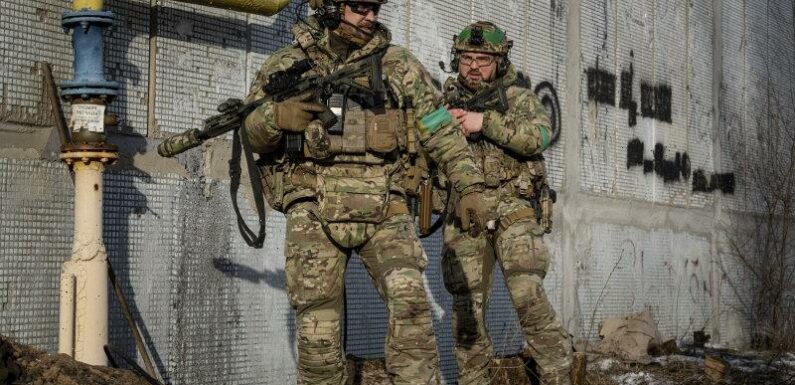
Kyiv: Russian forces have pressed forward their weeks-long drive to encircle and capture the eastern Ukrainian city of Bakhmut, where the commander of Ukraine’s ground forces described the situation as “extremely tense”.
Taking Bakhmut, the scene of some of the war’s bloodiest battles, would be Russia’s first major prize in more than six months and open the way to seizing the last remaining urban centres in the Donetsk region, one of four Moscow claims to have annexed in its “special military operation” in Ukraine.
Bakhmut, the site of the heaviest battles with the Russian troops, in the Donetsk region.Credit:AP
Russian President Vladimir Putin instructed the FSB security service on Tuesday (Ukraine time) to bolster security in the four regions – currently only partially controlled by his forces – and also to counter what he described as growing espionage and sabotage operations against Russia by Ukraine and the West.
He was speaking after a Russian regional governor said a drone had crashed near a natural gas distribution station on Tuesday in an apparent failed attack near the town of Kolomna, just 110 km southeast of Moscow.
Ukraine does not publicly claim responsibility for attacks inside Russia. If it was behind the Kolomna incident, it would be its closest attempted drone strike to the Russian capital since Russia invaded Ukraine just over a year ago.
Earlier, Russia’s defence ministry also accused Ukraine of launching two attempted drone attacks against two southern Russian regions overnight but said they caused no damage.
Ukrainian servicemen of Rapid Operational Response Unit patrol a street in Bakhmut on Friday.Credit:AP
‘City is on fire’
Around Bakhmut, Russian troops, including mercenary fighters from the Wagner Group, are trying to cut the Ukrainian defenders’ supply lines and force them to surrender or withdraw.
“Despite significant losses, the enemy threw in the most prepared assault units of Wagner, who are trying to break through the defences of our troops and surround the city,” Ukraine’s Colonel General Oleksandr Syrskyi said.
An unnamed soldier from Ukraine’s 93rd Separate Mechanised Brigade, speaking on the Telegram messaging app as explosions boomed in the background, struck a defiant note: “February 28, the town of Bakhmut. The city is on fire, the enemy is pressing. Everything will be Ukraine…”
Russia’s state-run RIA news agency released a video clip it said showed Russian Su-25 fighter jets roaring over Bakhmut. “We are glad they are ours,” says a man in the clip identified as a Wagner fighter, adding the jets helped them “psychologically”.
Ukraine’s military said Russia was shelling settlements around Bakhmut, which had a pre-war population of around 70,000 but now lies in ruins after months of intense trench warfare.
“Over the past day, our soldiers repelled more than 60 enemy attacks,” the military said early on Tuesday, including on the villages of Yadhidne and Berkhivka just north of Bakhmut.
A Reuters reporter who visited the area on Monday said he saw no sign of Ukrainian forces withdrawing and that reinforcements were arriving despite constant Russian shelling.
Ukraine’s eastern front line resembles “a grinding slog” and Russia is not likely to be able to make significant territorial gains in the near term, the US undersecretary of state for defence policy, Colin Kahl, said.
“So you may see small portions of territory change hands in the coming weeks and months. I do not think that there’s anything I see that suggests the Russians can sweep across Ukraine and make significant territorial gains anytime in the next year or so,” Kahl told a House of Representatives hearing.
Ukrainian soldiers in the Donetsk region hunkered in muddy trenches after warmer weather thawed out the frozen ground.
“Both sides stay in their positions because, as you see, spring means mud. Thus, it is impossible to move forward,” said Mykola, 59, commander of a Ukrainian front-line rocket launcher battery, watching a tablet screen for coordinates to fire.
The spring thaw has a history of ruining plans by armies to attack across Ukraine and western Russia, turning roads into rivers and fields into quagmires.
Russia – its forces replenished with hundreds of thousands of conscripts – has intensified its attacks all along the eastern front but its assaults have come at a high cost, says Ukraine, which is expected soon to launch its own counter-offensive.
Putin urges vigilance
In Moscow, Putin told officials of the FSB – a successor organisation of the Soviet-era KGB – they must stop “sabotage groups” entering Russia from Ukraine, step up protection of key infrastructure and prevent any Western efforts to revive what he called terrorist or extremist cells on Russian territory.
“Western intelligence services have traditionally always been actively working in Russia, and now they have thrown additional personnel, technical and other resources against us,” said Putin, himself a former KGB agent.
“We need to respond accordingly.”
Kremlin spokesman Dmitry Peskov repeated Moscow’s stance that it is open to peace negotiations but Kyiv and its Western allies must accept Russia’s annexation of four Ukrainian regions – Donetsk, Luhansk, Kherson and Zaporizhzhia – after referendums last September Kyiv and the West say were illegal shams.
“The constitution of the Russian Federation exists, and cannot be ignored. Russia will never be able to compromise on this, these are important realities,” Peskov told reporters.
Reuters
Get a note directly from our foreign correspondents on what’s making headlines around the world. Sign up for the weekly What in the World newsletter here.
Most Viewed in World
From our partners
Source: Read Full Article

